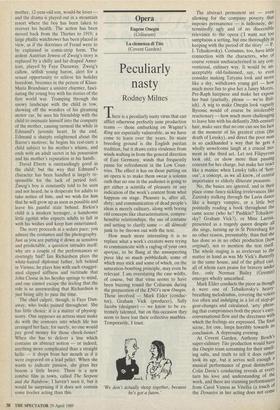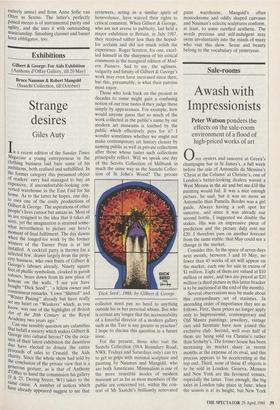Opera
Peculiarly nasty
Rodney Milnes
here is a peculiarly nasty virus that can afflict otherwise perfectly sane production teams — those embarking on Wagner's Ring are especially vulnerable, as we have come to learn over the years. Its main breeding ground is the English puritan tradition, but it draws extra virulence from winds wafting in from the general direction of East Germany, winds that frequently pause for refreshment in the Low Coun- tries. The effect it has on those putting on an opera is to make them swear a solemn oath that no one in the audience is going to get either a scintilla of pleasure or any indication of the work's content from what happens on stage. Pleasure is, after all, dirty; and communication of dead people's ideas is merely culinary, along with boring old concepts like characterisation, compre- hensible relationships, the use of costume and setting to clarify same — all demo& junk to be thrown out with the text.
How much more interesting it is to replace what a work's creators were trying to communicate with a ragbag of your own apercus, to be flung at the unsuspecting piece like so much pebbledash, some of which may stick and some of which, on the saturation-bombing principle, may even be relevant. I am overstating the case wildly, of course, but that virus seems to have been buzzing round the Coliseum during the preparation of the ENO's new Onegin. Those involved — Mark Elder (conduc- tor), Graham Vick (producer), Sally Jacobs (designer) — we know to be ex- tremely talented, but on this occasion they seem to have lost their collective marbles. Temporarily, I trust.
'We don't actually sleep together, because he's got a futon.' The abstract permanent set — even allowing for the company poverty that imposes permanence — is hideously, de- terminedly ugly and of no discernible relevance to the opera CI want not too sumptuous a setting, but one thoroughly in keeping with the period of the story' — P. I. Tchaikovsky). Costumes, too, have little connection with the characters, who of course remain uncharacterised in any con- ventional, culinary way. It would be un- acceptably old-fashioned, say, to even consider making Tatyana look and move like a shy, withdrawn young girl — how much more fun to give her a Janey Morris, Pre-Raph hairpiece and make her expose her bust (partially, please — we're Brit- ish). A wig to make Onegin look vaguely. Byronic would of course be intolerably reactionary — how much more challenging to leave him with his defiantly 20th-centurY hair, make sure that no one can see his face at the moment of his greatest crisis (the death of Lensky), and direct the poor man in so cackhanded a way that he gets a wholly unwelcome laugh at a crucial mo- ment in the third act. Let not Filipyevna look old, or show more than passing concern for her charge, but make her react like a maniac when Lensky talks of 'hon- our', a concept, as we all know, of central importance to elderly illiterate peasants.. No, the basics are ignored, and in their place come fancy-tickling irrelevances like Zaretsky stalking through the Larin dance like a hungry vampire, or a little boy pointedly reading a book throughout the same scene (who he? Pushkin? Tchaikov- sky? Graham Vick?), or Mme Larina, presented as a tragedy queen despite all she sings, turning up in St Petersburg for no other reason, presumably, than that she has done so in no other production (how original), not to mention the text itself. The whole staging is as irrelevant to the matter in hand as was Mr Vick's ButterflY in the same house, and of the gifted cast, all of whom earn praise for bravery under fire, only Norman Bailey (Gremin) emerges wholly unscathed.
Mark Elder conducts the piece as though it were one of Tchaikovsky's heavy
breathing melodramas, covering the voices too often and indulging in a lot of stop-go gear-changes and calculated, 'arty' phras- ing that compromises both the piece's easy, conversational flow and the directness with which the feelings are expressed. The final scene, for one, limps horribly towards its conclusion. A depressing evening. At Covent Garden, Anthony Besch's super-culinary Tito production would have the Onegin team screaming for their smell- ing salts, and truth to tell it does rather look its age, but it serves well enough a musical performance of great distinction. Colin Davis's conducting reveals at everY turn his love and understanding of the work, and there are stunning performances from Carol Vaness as Vitellia (a touch of the Dynastys in her acting does not come entirely amiss) and from Anne Sofie van Otter as Sextus. The latter's perfectly Poised mezzo is of instrumental purity and agility, and she uses it with outstanding musicianship. Smashing clarinet and basset horn obbligatos, too.



















































 Previous page
Previous page